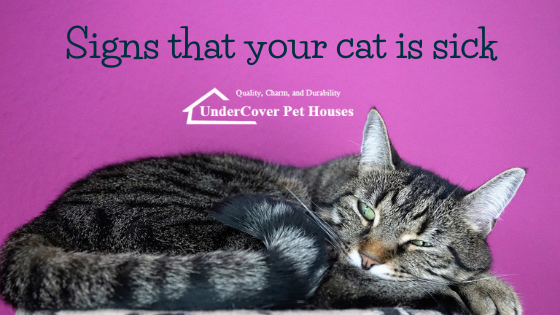 Loading... Please wait...
Loading... Please wait...Cat Care: How to Know When Your Cat Is Sick
Posted by Danny MacDonald on 2020 Dec 1st

Could my kitty be sick? For many cat parents, this is a tough question that can be tricky to answer. It is your cat’s nature to instinctively hide signs of weakness to avoid vulnerability. As a result, it can be difficult to identify health problems in your cat. Unfortunately, this behavior often leads to your cat becoming seriously ill even before you realize it. So how do you prevent such situations?
Some Common Signs of Illness in Cats
This article familiarizes you with the various signs and symptoms of illness in cats that can help detect health issues in your feline.
1. Behavioral Changes
One of the first signs of illness in cats is a behavior change. Your cat will exhibit sudden temperament changes. Generally, if your cat is active/friendly or playful, they may stop, and the cat may turn sedentary and reclusive. Alternatively, a laid-back cat may turn to be restless, vocal, or needy.
2. Changes in Appetite
Loss/change in appetite may be a sign of feline illness, stress. Besides, sudden weight loss, a sharp increase in appetite and an inability to eat are other signs that your cat needs to see a vet.
3. Respiratory Distress
Breathing difficulties accompanied by signs such as weakness, seizures, wheezing, loss of consciousness are a medical emergency that should be treated immediately. Such symptoms may indicate a stroke, hyperthermia, or intoxication.
4. Increased Thirst and Drinking
Polydipsia is a significant indicator of cat illness. Most cats aren't big drinkers - especially those that feed on wet food. Consequently, a sudden increased thirst is a cause for alarm, and you should consult your vet immediately. Common causes of polydipsia include; kidney dysfunction, liver disease, diabetes, hyperthyroidism, urinary tract diseases, etc.
5. Fever
High fever is an important sign of illness in cats that necessitates a trip to the vet. Frequently monitor your cat's body temperature with an ear thermometer to diagnose a fever and detect illness.
6. Vomiting
Vomiting is typical behavior and reaction in cats. Commonly, vomiting may be caused by hairballs, grass-eating, or eating too fast. However, it becomes a massive concern once your cat repeatedly vomits and when the vomits are accompanied by illness symptoms, including weight loss, diarrhea, lethargy, etc.
7. Distress when Urinating
If your kitty shows any signs of distress or vocalizes their struggle when urinating, they need to visit the veterinary immediately. Although bladder problems have become quite common in cats, some urinary health problems like urinary blockage may be life-threatening. Be on the lookout for signs like frequent urination, labored or painful urination, or bloody/ discolored urine and urine accidents outside the litterbox.
8. Skin Lumps and Bumps
As cats age, they develop growths and tumors, and they are often benign. However, not all lumps and bumps are harmless to your cat. Some may be caused by a bite wound or abscess, bee stings, feline acne, parasites, or cancerous tumors. Ensure that you frequently run your hands on your cat's coat to check for bumps and lumps. Should you notice any unusual lumps, have your cat immediately checked by a vet to avoid severity.
9. Bad Breath
Unknown to most cat owners, bad breath /odor can indicate the presence of a mouth ulcer, mouth sores, oral diseases, or even cancer. Drooling can indicate severe oral illness, inflammation, or ingestion of toxic or foreign substances. Other health issues such as kidney failure or liver disease can also cause bad breath in cats.
10. Dry Skin and Dull Coats
Unless it is age-related, dry/matted and dry skin may indicate parasites, infection, or allergies. Additionally, regular baths, weight issues, poor dental health, liver, kidney, diabetes, poor nutrition, or dehydration can make your cat's coat and skin look unhealthy.
11. Lameness
Limping in cats is easier to detect in feral cats rather than indoor cats. From the hesitation to touch their paw to the ground to reluctance to jump, lameness can be caused by several underlying reasons including sprain, injuries, fractures, infection, tumor, or arthritis. If you notice any consistent signs of lameness, schedule a visit to your vet.
Things to Remember
If your cat is eating, behaving, sleeping, and playing normally, they are not likely to be sick.
If your cat is agitated, cranky, lethargic, vomiting, has diarrhea, pale, or having breathing problems, make an immediate vet appointment.
The most common symptoms of cat illness are loss of appetite, vomiting, diarrhea, shedding, lethargy, and breathing difficulties. If your cat exhibits one or more of these symptoms, it's time to take them to the vet.
Knowing the common signs of sickness in cats can help your cat get medical attention early enough. Besides, it gives an improved peace of mind and enables you to avoid critical health problems and costly treatments in the future.
